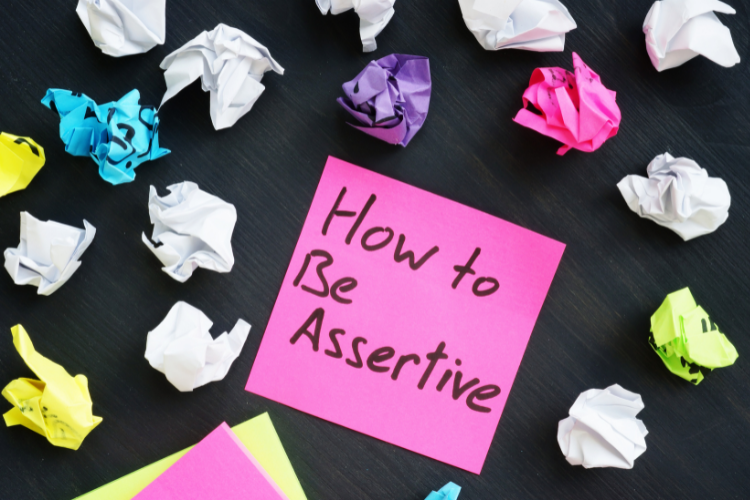Are you tired of nodding along when you should be speaking up?
Have you ever felt your ideas fading into the background while others take center stage?
Having the ability to assert yourself is a skill needed to make any real contribution to the world around you, and yet, many times, we shy away from it out of a desire to be liked or to avoid confrontation.
The reality is that having some level of assertiveness has become a necessary skill for individuals seeking personal growth and professional success. Whether focused on excelling in your career, leading a team, or enhancing your daily interactions, assertiveness can be transformative.
A willingness to confidently express your thoughts, opinions, and boundaries can help you establish yourself as a capable leader, build stronger relationships, and clear a path to personal fulfillment.
In this blog post, we’ll explore the misconceptions around assertiveness, provide practical tips for asserting yourself effectively, and shed light on how it can empower you personally and professionally.
What is Assertiveness?

Assertiveness is a foundational communication style in effective leadership, empowering individuals to express their thoughts, opinions, and needs confidently.
To assert yourself means to convey your ideas and values firmly and respectfully without undermining others. In leadership, assertiveness is pivotal in driving positive change and achieving organizational goals.
A leader who can assert themselves constructively inspires trust, encourages open dialogue, and fosters a culture of collaboration.
By assertively communicating expectations, delegating tasks, and providing constructive feedback, leaders can create an environment that empowers their team members to excel and contribute their best efforts.
Furthermore, assertive leaders are more likely to address conflicts head-on, facilitating quick resolutions and maintaining a peaceful work environment.
Benefits of Assertiveness

In addition to the stress management benefits research has found to be associated with being assertive, when related to leadership, assertiveness holds significant value, particularly when it comes to decision-making and influencing others.
When you assert yourself as a leader, you confidently communicate your convictions and make informed choices.
This assertive approach ensures team members respect and implement your decisions, fostering a sense of direction and purpose.
Additionally, assertive leaders can influence their colleagues, superiors, and stakeholders by persuasively presenting their ideas and standing up for their beliefs.
By demonstrating assertiveness, leaders create an environment where diverse perspectives are welcomed and healthy discussions occur, leading to more innovative and well-rounded solutions.
Assertiveness in leadership can also help you establish a solid personal brand, showcasing your authenticity, self-assurance, and ability to take charge.
Ultimately, assertiveness empowers leaders to make a positive impact, gain the respect of their peers, and drive meaningful change within their organizations.
9 Ways to Assert Yourself

If you tend to be conflict-averse and find asserting yourself challenging, check out these nine effective strategies to help you gain confidence with this communication style.
Clearly Define Your Boundaries
To assert yourself effectively, it’s imperative to establish clear boundaries. Start by identifying your values, needs, and limits. Communicate these boundaries openly and respectfully, ensuring others understand your expectations.
By doing so, you will gain the respect of others and maintain a healthy balance in your relationships and leadership positions.
Practice Active Communication
Assertiveness goes hand in hand with effective communication. To assert yourself confidently, focus on expressing your thoughts, feelings, and opinions directly and concisely.
Use “I” statements to convey your perspective without sounding confrontational. Active listening is equally important as it shows respect and enables you to understand the point of view of others.
Engage in open dialogue, fostering an environment of mutual understanding and collaboration.
Develop Self-Confidence
Assertive communication requires self-confidence. Embrace self-affirmations and positive self-talk to boost your self-esteem and confidence levels.
Celebrate your accomplishments and learn from any setbacks. Surround yourself with a supportive network of people who believe in your talents and abilities.
Remember, confidence is contagious; when you believe in yourself, others will, too.
Embrace Non-Verbal Assertiveness
Non-verbal cues play a vital role in assertiveness. Be mindful of maintaining good posture, making direct eye contact, and using appropriate gestures to convey confidence.
Pay attention to your tone of voice, ensuring it is firm and assertive but not aggressive. Practice strong body language regularly, as it reinforces your message and commands attention.
Set Goals and Take Action
Asserting yourself effectively requires a proactive approach. Set clear goals and objectives in your personal life and leadership role.
Break them down into smaller, achievable steps. Taking action demonstrates your determination. Track your progress and make necessary adjustments along the way.
Embrace Self-Awareness
Asserting yourself begins with self-awareness. Take the time to identify your strengths, weaknesses, and values.
Recognize your unique perspectives and insights, and have confidence in the value they bring to the table. By embracing your authenticity, you will feel more empowered to assert yourself in any situation.
Overcome Self-Doubt
Self-doubt can be a significant roadblock to asserting yourself. Challenge your inner critic and cultivate a positive mindset.
Remind yourself of your achievements, skills, and the value you bring to your role. Surround yourself with a supportive network of mentors, colleagues, and friends who uplift and encourage you.
Overcoming self-doubt will help you embrace new challenges and assert yourself effectively.
Embrace Continuous Learning
Never stop learning and growing. Invest in your personal and professional development by seeking opportunities for growth and improvement.
Attend workshops, webinars, and training programs to enhance your skills and knowledge. The more knowledgeable and confident you become, the easier it will be to assert yourself and contribute meaningfully in any situation.
Understand the Power of Assertiveness
Assertiveness is the balance between passivity and aggression. It involves expressing your thoughts, needs, and opinions respectfully and confidently while considering the rights and boundaries of others.
Recognize that assertiveness is not about dominating or controlling others but about effective communication and building healthy relationships.
Final Thoughts

Assertiveness is a vital skill that can significantly impact your personal and professional life. Whether striving to make your voice heard in a leadership role or looking to navigate challenging situations confidently, assertiveness is critical.
Asserting yourself isn’t about overpowering others; it’s about valuing your thoughts, needs, and contributions as much as anyone else’s. Through our exploration, we’ve uncovered the art of clear communication, setting boundaries, and remaining empowered in the face of self-doubt.
Remember to find the delicate balance between firmness and empathy, standing your ground without trampling on others. As you navigate this path, embrace the authenticity of your voice and the strength in your convictions.





